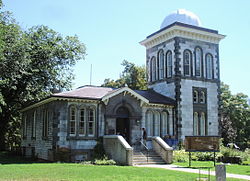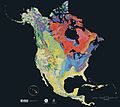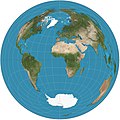Portal:Geology
The Geology Portal

Geology (from Ancient Greek γῆ (gê) 'earth' and λoγία (-logía) 'study of, discourse') is a branch of natural science concerned with the Earth and other astronomical objects, the rocks of which they are composed, and the processes by which they change over time. Modern geology significantly overlaps all other Earth sciences, including hydrology. It is integrated with Earth system science and planetary science.
Geology describes the structure of the Earth on and beneath its surface and the processes that have shaped that structure. Geologists study the mineralogical composition of rocks in order to get insight into their history of formation. Geology determines the relative ages of rocks found at a given location; geochemistry (a branch of geology) determines their absolute ages. By combining various petrological, crystallographic, and paleontological tools, geologists are able to chronicle the geological history of the Earth as a whole. One aspect is to demonstrate the age of the Earth. Geology provides evidence for plate tectonics, the evolutionary history of life, and the Earth's past climates.
Geologists broadly study the properties and processes of Earth and other terrestrial planets. Geologists use a wide variety of methods to understand the Earth's structure and evolution, including fieldwork, rock description, geophysical techniques, chemical analysis, physical experiments, and numerical modelling. In practical terms, geology is important for mineral and hydrocarbon exploration and exploitation, evaluating water resources, understanding natural hazards, remediating environmental problems, and providing insights into past climate change. Geology is a major academic discipline, and it is central to geological engineering and plays an important role in geotechnical engineering. (Full article...)
Recognized content -
In March 1980, a series of volcanic explosions and pyroclastic flows began at Mount St. Helens in Skamania County, Washington, United States. A series of phreatic blasts occurred from the summit and escalated for nearly two months until a major explosive eruption took place on May 18, 1980, at 8:32 a.m. The eruption, which had a volcanic explosivity index of 5, was the first to occur in the contiguous United States since the much smaller 1915 eruption of Lassen Peak in California. It has often been considered the most disastrous volcanic eruption in U.S. history. (Full article...)
Related portals
Get involved

Dimitrij Andrusov (7 November 1897 – 1 April 1976) was a Slovak geologist of Russian origin, member of the Slovak Academy of Sciences. He was first professor of geology on Slovak colleges. He is considered the founder of modern Slovak geology. (Full article...)
Did you know
- ... that the Danish geologist Tove Birkelund received a gold medal for her early work on fossils of Scaphites in Greenland?
- ... that from 1904 to 1911 Arthur Lewis Hall covered 17,479 miles (28,130 km), mostly on foot, to map the geology of the Transvaal?
- ... that the groundwater level of a coastal aquifer system changes with the tide?
- ... that Kenneth Creer supported applying cosmology to geological problems?
- ... that English amateur geologist Charlotte Eyton wrote a number of papers and pamphlets on the geology of the Wrekin, a part of Shropshire, between 1862 and 1870?
- ... that Karen Hanghøj, the 2023 winner of the William Smith Medal for applied geology, became the first female director of the British Geological Survey, 183 years after it was founded?
- ... that geologist Gilbert Wilson was the fifth Wilson at school, so he was known as "Quintus"?
- ... that Frederick Murray Trotter had a distinguished career as a field geologist despite losing a part of his skull and an eye to shrapnel during World War I?
Top 10 WikiProject Geology Popular articles of the month
Featured pictures
Main articles
Selected pictures
Associated Wikimedia
The following Wikimedia Foundation sister projects provide more on this subject:
-
Commons
Free media repository -
Wikibooks
Free textbooks and manuals -
Wikidata
Free knowledge base -
Wikinews
Free-content news -
Wikiquote
Collection of quotations -
Wikisource
Free-content library -
Wikiversity
Free learning tools -
Wikivoyage
Free travel guide -
Wiktionary
Dictionary and thesaurus





























































